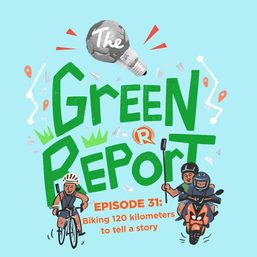SUMMARY
This is AI generated summarization, which may have errors. For context, always refer to the full article.
![[Vantage Point] Is Toyota Philippines undercutting its parent company?](https://www.rappler.com/tachyon/2023/09/tl-toyota-undercutting.jpg)
Contrary to what naysayers are claiming, climate change is real.
Climate change, which encompasses global warming, refers to all the environmental changes we are experiencing now: rising sea levels; shrinking mountain glaciers; accelerating ice melt in Greenland, Antarctica, and the Arctic; and shifts in flower/plant blooming times, among others.
The world is now warming faster than at any point in recorded history. Warmer air causes the ice to melt and flow more rapidly to seas and oceans. When ice caps melt and the ocean level rises, low-lying areas become flooded. As greenhouse gas emissions blanket the Earth, they trap the sun’s heat, which leads to global warming and climate change.
Fortunately, more businesses worldwide are adopting more sustainable and eco-friendly business practices. They are “going green.” Green businesses are companies that are forward-thinking when it comes to human rights, environmental concerns, and related issues. They do not make any negative impact on the environment, economy, or community.
Because car emissions contribute to global warming, Toyota Motor Philippines has billed itself as “the green car company.” This is quite misleading. It is Toyota Motor Corporation, the parent company, that richly deserves the sobriquet, having developed the world’s most popular and most efficient hybrid motor system, supplying more than 10M hybrid vehicles globally over the last quarter-century or so.
In Australia, where there are no tax breaks provided for hybrid cars, the retail price difference between a hybrid and non-hybrid model Toyota Cross for the same trim level is AUD$2575 or P93,200. Importantly, the hybrid version is available across all trim levels.
Why price it higher?
By contrast, in a demonstration of environmental responsibility, the Philippine government has reduced the customs duty tax rate on hybrid cars from 20% to 10% to encourage uptake of these vehicles. The local dealer sells the base Toyota Cross for P1.312 million.
The local customs duty tax imposed by the government would amount to around Php170,000. For a hybrid model, while the landed price may be Php60,000 -Php70,000 higher than the regular gasoline model, the tax break provided by the government would allow the local dealer to retail the equivalent trim level hybrid car for the same price as the regular gas model; that is, if the local dealer wanted to.
Alas, the base model Cross is not available in hybrid format. Instead, the local dealer only sells the high trim model for a hefty P1.68M and keeps the stock low, with the local dealer making a fat margin.
If Toyota Philippines brought in the base model Cross hybrid, they could sell it for the same pricing as the gasoline model because of the government tax break. Of course, with the equivalent pricing, customers would then buy the hybrid version instead of the pure gasoline car model, which is precisely what all stakeholders hope.
The car owners would be able to save money since their motor vehicles will consume considerably less fuel. The Toyota hybrid cars provide excellent performance in terms of gas mileage for city driving.
It is a win-win for everyone.
The local dealer’s sales will go up. Most importantly, the environment will benefit. Hybrid and electric cars release fewer emissions – about 46% less greenhouse gas than traditional gas-powered vehicles – which results in improved air quality and cleaner streets.
Walk the talk
If Toyota Philippines wants to bask in the “going green” glory, it should do its share to protect the world’s ecosystem. It should walk the talk, as it were, and supply the Philippine market with base trim hybrid models for the same pricing as the straight gasoline model.
Obviously, more profit can be made from the sale of high-end cars. This is fine for the moneyed class, but that is a limited market. A high-end car costs much more than the price of the base model. That effectively shuts out car buyers with a limited budget.
The local Toyota dealer should rethink its sales strategy and offer customers a full range of choices, from the most basic to the fully loaded model in the hybrid car category, which is what is being done in other markets. This would give more Filipinos access to more affordable hybrid vehicles. – Rappler.com
Val A. Villanueva is a veteran business journalist. He was a former business editor of the Philippine Star and the Gokongwei-owned Manila Times. For comments, suggestions email him at mvala.v@gmail.com
1 comment
How does this make you feel?










![[EDITORIAL] Kamaynilaan para sa tao, hindi para sa mga sasakyan](https://www.rappler.com/tachyon/2024/04/animated-traffic-april-2024-carousel.jpg?resize=257%2C257&crop=410px%2C0px%2C720px%2C720px)

![[Rappler’s Best] Where the streets have no name](https://www.rappler.com/tachyon/2024/03/2-1.jpg?resize=257%2C257&crop=307px%2C0px%2C720px%2C720px)

Time to recognise that very few Filipino’s have cars, less than 6% and mostly the wealthy elite. Time to focus on ordinary people who benefit from policy around reducing car size and electrification of two and three wheel vehicles in general.
Toyota are partly responsible for the rise in killer SUV vehicle sales here. The quicker we tax them off of our roads the better. They are also way behind the competition in fully electric cars. If we do need any strategic partnerships it is with companies like BYD who produce the lower cost, smaller and safer EV’s. Please can we think more rationally about our environment and stop pandering to the car lobby.